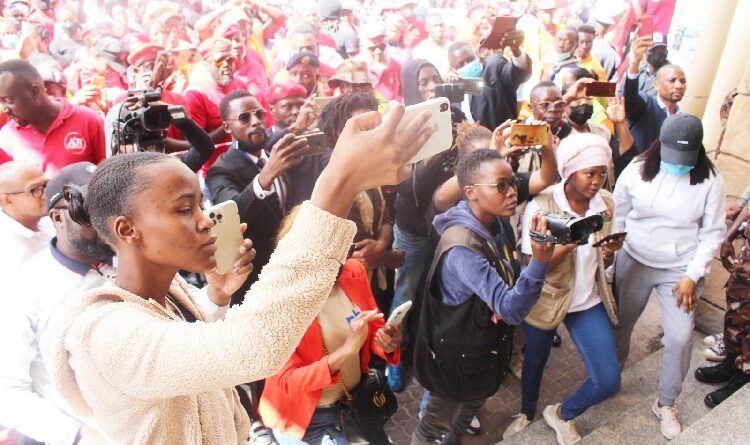Journalists told to wear media jackets when covering protests – The Namibian
[ad_1]
NAMIBIAN Police chief inspector general Joseph Shikongo said journalists should wear media jackets and carry press cards to avoid being caught in the crossfire when covering demonstrations.
This is to avoid journalists being assaulted by the police, Shikongo said at the opening of a workshop for regional community affairs, community policing and public relations officers in Windhoek yesterday.
Shikongo said the visibility of journalists at public order management events is crucial.
“Journalists must be identical and more visible by wearing a reflective media jacket. Anybody who is pushing or manhandling the media in a manner that is inappropriate, is not right,” Shikongo said.
He referred to a case where a Namibian Broadcasting Corporation cameraman from the north was pepper-sprayed by a security guard at Omuthiya as unacceptable.
“These are situations we don’t want to repeat, because journalists are there to bring information to us,” he said.
Shikongo urged the media to remain and report objectively, adding that public relations officers must be objective as well, and should not hide information.
“If there is an incident that happened, we need to give information as it is,” Shikongo said.
The Press Freedom Index (PFI) evaluation of 2022 shows that Namibia retained its top position in Africa, 18th in the world, out of 180 countries and territories in media freedom, he said.
“This demonstrates our government’s commitment to the ideals of world free press with an emphasis on effective governance, fortified by our democratic values, processes, systems and institutions,” Shikongo said.
He said the government is anticipating the process of passing the access to information bill, which would propel the country to one of the foremost positions in the world on the World Press Freedom index.
WORKSHOP
Shikongo said the workshop will enhance the competencies and abilities of all participants, as well as enable them to use all forms of media and information communication tools that will mutually help them build beneficial relations between the police and stakeholders.
“The workshop is further aimed at capacitating participants by delivering effective mitigation approaches when dealing with the public through various media platforms, and crime prevention without compromising the integrity of the force,” he said.
The four-day workshop is being attended by 30 officers, which comprises 14 officers from public relations, one from community policing and 15 regional community affairs officers.
A variety of lectures on information disclosure, news collecting, the concept of community policing and distributing local information to the media will be covered in the workshop. Information exchange regarding ongoing criminal investigations, freedom of speech, information access and journalist safety will also be discussed.
[ad_2]
Source link

